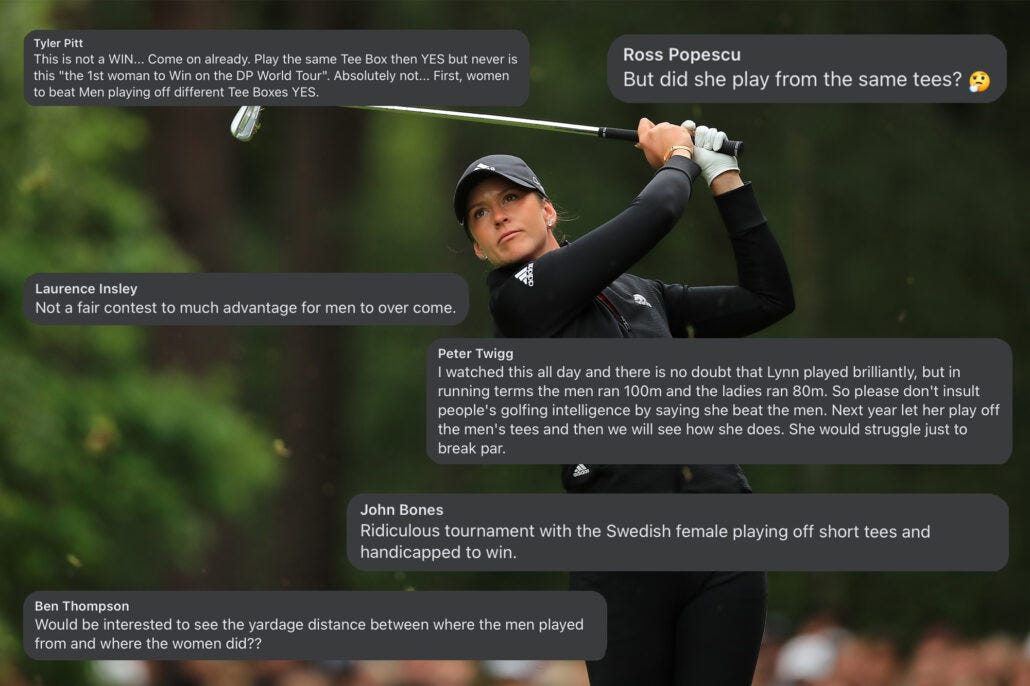No such thing as a free launch; Golfers as comms defence; A lawyer's guide to enabling; MLS x Apple; What the IPL will do next; The long view; Absence of women; Anatomy of a deal; Web3 WTF?
Overthinking the sports business, for money
LIV Golf: No such thing as a free launch
What’s the money for?
What job does it do?
It wasn't for the quality of the golf, that’s for sure: Only eight of the 48 players finished under par, perhaps a consequence of the complete absence of jeopardy.
The winner was Charl Schwartzel whose three afternoons netted him $4.75 million. Last place was Andy Ogletree, the 2019 U.S. amateur champion, who got $120,000, quadrupling his pro career earnings.
The value exchange was not for their work on the course, but in the press tent.
That’s where they got a sweat on.
I particularly enjoyed Rob Harris’ press conference questions being made in to a TikTok meme.
So, player as comms shield.
A feature of LIV is the absence of visible senior executives.
There’s Greg Norman. There was Sean Bratches, until he jumped, a week before the event.
There’s middle men doing deals and business-as-usual type sports business stuff: Ioris Franchini selling media. Atul Khosla running the event show. But they ain’t sitting in front of the sports news lobby any time soon.
There’s a gap. A vacuum that’s been filled with acronyms, media noise and cliches - PIF, MBS…’Saudi money’, sportswashing.
Tim Crow made this point in relation to Kerry Packer’s cricket circus in the 1970s.

This is what the money is for.
It’s to take the heat. To squirm. To have your reputation shredded in real time on Sky Sports News, before they jump to summer transfer gossip.
A bucket of cash in exchange for an asterisk that will now forever attach to your name, a paragraph in your obit.
Golfer, golfer, Yada Yada Yada…*He took the money.
Money will protect Schwartzel from any real social impact. He won’t suffer the way rebel West Indian cricketers suffered after touring apartheid South Africa, Schwartzel’s homeland.
The Enabler’s Defence
In his post round presser, Schwartzel offered a variation on the lawyer’s defence: I’m a professional, this is my job.
Lee Westwood took the same comms route. (Thomas Tuchel said something similar in the context of Abramovich and Chelsea).
This will be a comms line many sports stars will adopt.
But if you act like a lawyer, we’ll treat you as a lawyer
Players and lawyers are the two essential constituencies in a sportswashing strategy.
Lawyers are the enablers-in-chief.
Their amorality is masked by the fair trial argument: if someone is being accused of a criminal activity they are entitled to a professional defence. This is how civilised societies work, and we all agree with it.
But…
Many big and famous law firms don’t just defend criminals, they operate as quasi-PR agencies, under the guise of reputation protection, using litigation defamation action to silence critics with ‘slap suits’.
This is where the money is.
So, acting on behalf of a corrupt oligarch or vile regime brings a series of considerations, which have a direct read across to the world’s best sports stars.
You don’t have to be the person who defends them, there’s no obligation on a law firm to take on a corrupt client, so you have a choice and can decide where your ethical boundaries are.
It’s perfectly possible to do legitimate things for unsavoury clients. The question is, do you want to take on an unsavoury client? Many lawyers will say yes, it’s my job and is within the law.
The legal profession is wrestling with this issue, because it’s about how lawyers want to be viewed by the wider world.
Individual law firms are not the people to be making that decision. They need better regulation by their own professional bodies who help them draw the lines as to what’s acceptable and what isn’t.
Each of these points apply directly to golfers and any other sports star who wants to use their fame and influence to promote bad regimes or dodgy money.
See also:
What if…it’s all about MBS ensuring Saudi influence with America’s next president?
From The New Yorker:
Another function of liv Golf may be to funnel Saudi money to you-know-who, since two of the eight golf courses on the 2022 schedule—one in Florida and one in New Jersey—have “Trump” in their name. If that’s the strategy, it’s consistent with two other recent Saudi investments: two billion dollars in a fund partly managed by Trump’s son-in-law Jared Kushner and a billion dollars in a fund partly managed by Trump’s Treasury Secretary, Steve Mnuchin. Both of those outlays were made within months of Trump’s grudging departure from the White House.
The Long View - where dictators and fans unite
One of the conversations around LIV is about returns.
There’s an assumption that this is about sportswashing, so there isn’t a commercial model that we’d recognise.
Fwiw, I think this is wrong, or at least, a dodgy read on what’s happening.
It ignores a key strategic advantage - time.
We live in an environment in which longer term planning is all but extinct outside a few particular groups.
Private equity and other types of investment are focused on returns as soon as they enter the front door. Even the most patient of patient capital is focused on building toward an exit.
Chairs, Board members and CEOs come and go.
Governments are election obsessed.
Players are an injury away from irrelevance.
That leaves fans, who are in it for life.
And billionaire petro-dictators.
The absence of women
Golf’s two disruptor leagues have ignored women. And mixed team golf was what woulda, shoulda happened in Rio, when golf reappeared in the Olympics.
Both of which bits of context made Linn Grant’s victory in the DP World Tour’s first mixed event timely.
The haters jumped in, as they do.
And they were elegantly dismantled by Hannah Holden of National Club Golfer
The men’s course totalled 7,001 yards, while the women’s was 5,929 yards – so 15% shorter. (Remember that number, it’s important.)
I have seen many complaints that the women were driving it past the men from their tee boxes. This is one of the keys to why this tournament was so well set-up.
According to TrackMan, a male pro averages 172 yards carry with a 7-iron compared to 141 yards for a female pro. For condition to be fair – as in both players can hit a driver, 7-iron into a par-4 – the woman’s drives have to finish beyond the men’s.
The chart below shows the results. Any hole highlighted red meant the woman had a disadvantage, those in yellow were identical, and any in green advantaged the women.
Hear also, UP248: Andy Gardiner wrestling with why his Premier Golf League option doesn’t include LPGA or LET players.
The Long View - The IPL media rights auction
Mukesh Ambani’s Viacom18 just paid $3.05bn for IPL streaming rights until 2027.
Disney-owned Star India retained the TV contract for $3.02bn.
The two deals combined are more than double the $2.4bn Star paid for the previous five seasons of the IPL.
The winning bid for the TV rights - a period that incorporates 410 IPL matches - were sold for about $7.36m (£6.1m) per game.
A feature of the IPL is the comparatively small match inventory, when compared to other global properties such as Premier League and NFL.
One conclusion: The media market is telling IPL to expand.
But how? Where?
Within India: More games, more franchises, more time in the calendar.
Elsewhere: An IPL bundle, looping together franchises in The Hundred, The Big Bash etc.
Both will hit test cricket and undermine the role of the ICC and it’s inventory, which is just about to go to market.
The Long View - MLS and Apple
Apple’s bet on US club soccer goes to 2032.
That length of deal gives the league a runway to build out a story for a generation. By defining Apple as a ‘digital rights partner’ it leaves MLS to sell the same games to television in every territory.
The duration of the Apple deal will be envied by Premier League and other European leagues which remain shackled to three year terms, a legacy of EU legislation against Sky in the early 2000s.
This was referenced by Claire Enders as an anachronism of a pre-FAANG era. (The long answer lies in the EU’s Audio Visual Directive here).
Apple’s involvement adds weight to Tom Fox’s point about the long term value of the MLS, made on UP214.
Fox was chief executive of Premier League club Aston Villa during the ownership tenure of fellow American Randy Lerner, led Arsenal’s commercial team under CEO Ivan Gazidis and was president of MLS franchise the San Jose Earthquakes.
Let's take a hypothetical, the private equity group that was prepared to put all that money against The Super League. So let's say there's $4 billion out there. And someone comes in and says to Major League Soccer: give us your television rights on a global basis. Give us 25% of equity in your combined league. And over the next 10 years, we'll give you $4 billion with a requirement that money gets put into the player pool and gets spent on players. As a hypothetical, is that a model that some bankers sitting around a table would think makes some sense, because then I own the television rights I'm putting 400 million extra dollars into the player pool, so the quality on the field is going to get better. The value of the TV rights then goes up, so I'm actually putting my money into something that's raising the potential for my investment to become more valuable. And what you do is you then leapfrog the Mexican league, the Eredivisie, the Belgian league, the French league probably. You leapfrog every other league and you put yourself in the top two or three, in terms of your ability to compete with player salaries. Now you've then given up a percentage of equity on your business forever. But to do that, and then add more enterprise value, I think is a reasonable conversation
Pic of the Week: Big Eventers conquer Everest
Credit: Queuing to Summit Everest, 2019, by Nirmal Purja (via @sportingintel/Nick Harris)
Web3 applications are not all shit #1 - Unionisation
I’m collecting non-sport web3 applications for our upcoming event, Web3 WTF.
This caught my eye.
Via Dirt:
Last week, PactDAO, a NYC-based mutual aid collective, hosted an event in Brooklyn titled Decentralized Organizing and the Labor Movement. Speakers included Danny Spitzberg from Exit To Community Collective, Larry Williams Jr. from LaborDAO, and Madam Cult Leader from Wonderverse. The event was at Hex House, formerly known as Soft Surplus, an industrial collective arts space in East Williamsburg—far from the polish of typical tech panel venues like Betaworks or NeueHouse.
Among the panel was a shared frustration with Web3’s apolitical financialization as well as the dismissal of anything crypto-related from the left.
Anatomy of a deal - the podcast plan
This week’s podcast goes inside the sponsorship sales process.
Guests
Buy side - Celine Del Genes, Adidas
Sell side - Rob Grenville-Jones, RFU
Consultant view - Dan Gaunt, Turnstile
What is it about?
A grown up conversation that takes the listener inside the process of buying and selling major sport sponsorships.
Intro:
Scenario - The Massive Unofficial Partner Official Partnership Opportunity #MUPOPO
(This conceit frees us from talking specifically about clients or real properties etc. However, please feel free to use real world examples in the conversation as appropriate).
Unofficial Partner’s key objective is to make as much cash as we can.
First question to all:
What are the mistakes rights holders often make when approaching prospective brands.
What are the incentives at play during negotiation on both sides of the table?
The Middle bit
There are some big words and ideas lurking below the surface of this conversation. Let’s unpick them.
Trust - how is this cultivated? How quickly can it be established?
Ego - personal and corporate. Pride. How does this impact on how the deal is communicated publicly?
Intangibility - the role of gut feeling v rationality, head v heart; note Celine’s house buying analogy, the role of emotion, the buy side job of selling the deal to the board, what are the broader corporate politics that play in to the decision to buy a big partnership?
Data - what role does it really play? Let’s put some detail on the d-word, does perfect data exist, or is it an illusion? Is data’s role to support hunches - see intangibles, above?
The Independent view - how is independence defined in this scenario? What’s the difference between an independent and biased third party? Does anyone believe sell side commissioned research? What role does it play?
OUTRO - The deal’s done. How do we communicate it to the media?
Blame game: what happens when things go wrong?
The Job: Portas Consulting - Associate Partner – London
The Blurb: Portas Consulting is the leading senior advisory firm dedicated to sport. We serve sports clients globally on major events and competitions, governments on their sport policy, sports bodies on projects transforming lives in local communities.
We are looking to bring on board a new member of our global leadership team, focused on providing leading edge advice to clients in their commercial and media strategies and plans. You will have senior experience in relevant businesses and in a top tier consultancy and have an entrepreneurial track record.
The Link: Job Openings (peoplehr.net)







